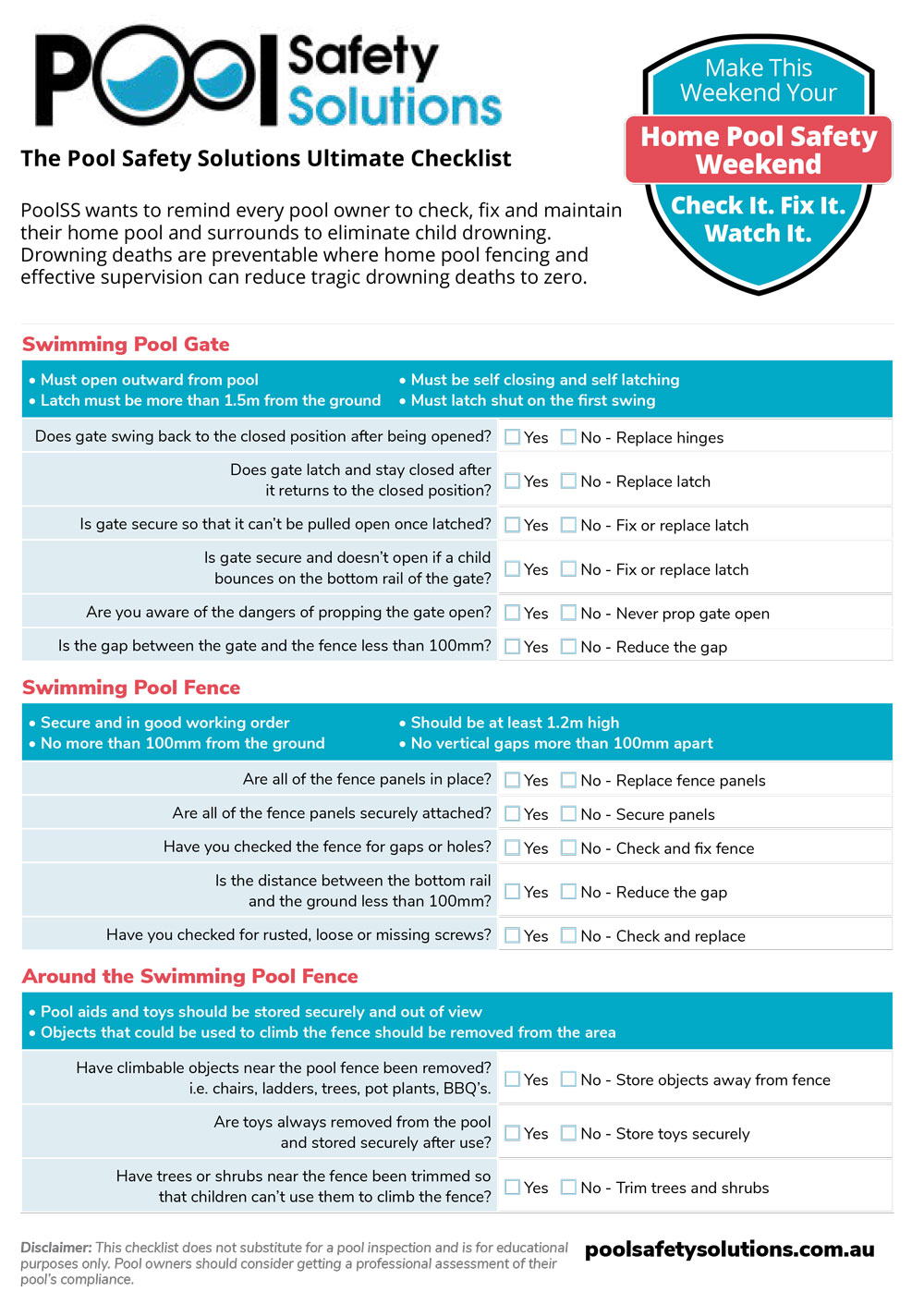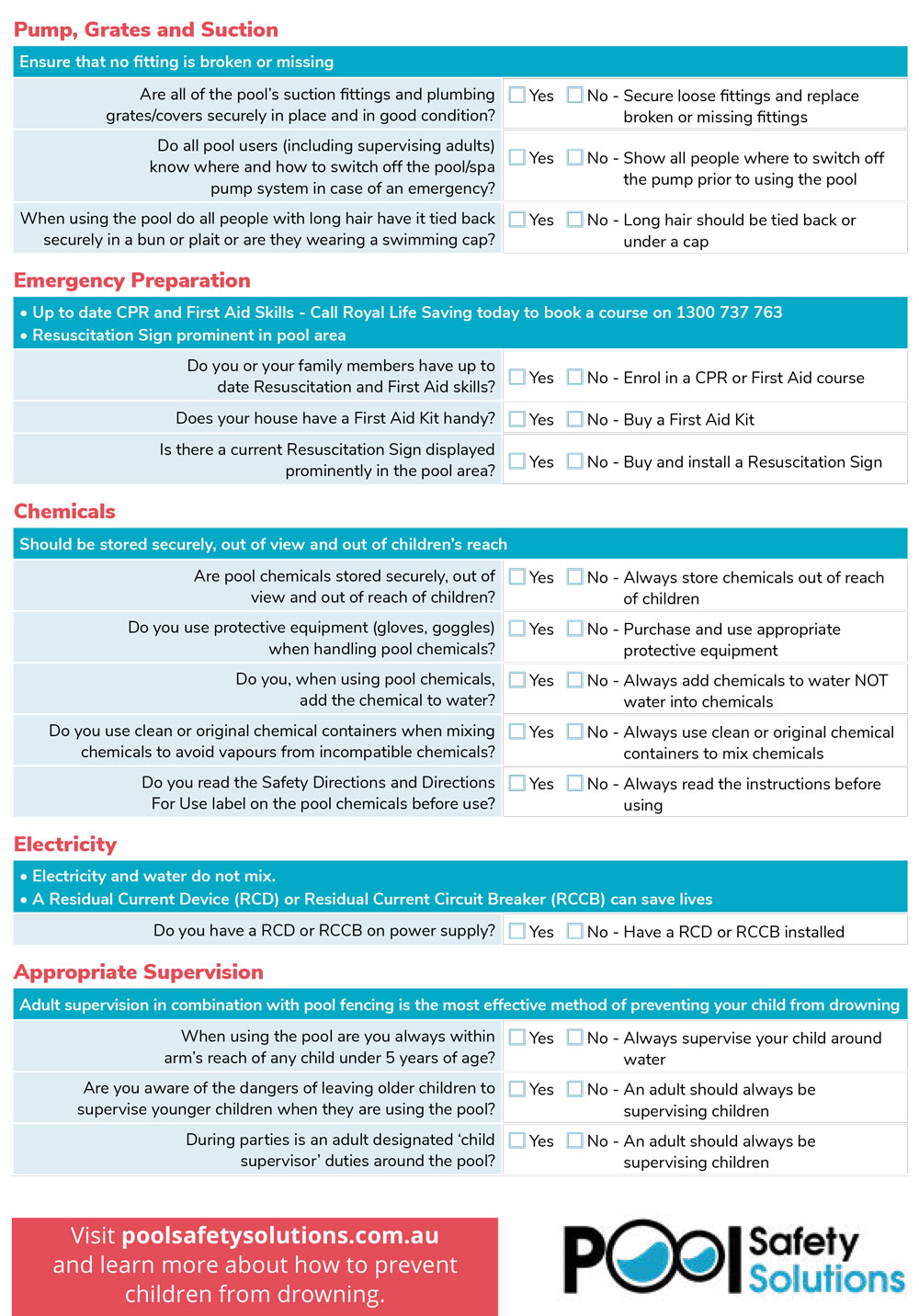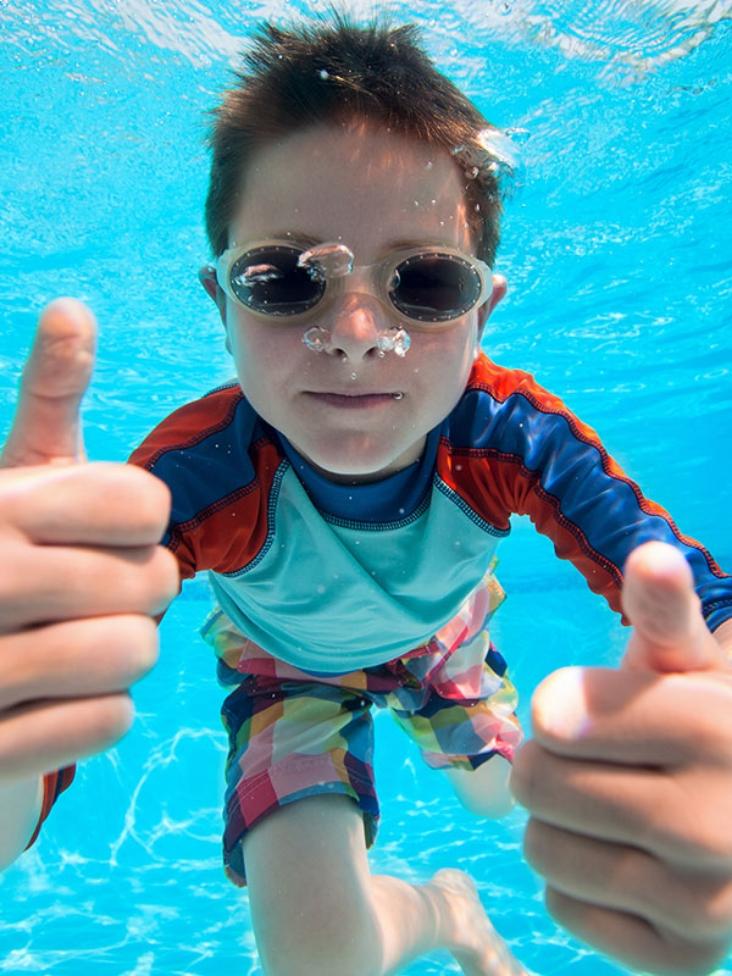Have all the Pool Safety questions?
All The Pool Safety FAQs
What is a pool?
The QBCC Queensland Building & Construction Commission classes a swimming pool or spa >here and as
- an above or below ground structure capable of holding 300mm of water or more, and
- primarily used for swimming or bathing.
NSW Fair Trading defines a pool >here as any excavation, structure or vessel including swimming pools and spa pools that are
- capable of being filled with water to a depth greater than 300mm, and
- used, designed, manufactured or adapted for swimming, wading, paddling or any other human aquatic activity
The VBA Victorian Building Authority defines them >here as
- above-ground pools and spas, including relocatable and inflatable pools capable of holding more than 300 mm (30 cm) depth of water and require assembly on site.
- in-ground pools and spas
- indoor pools and spas
- bathing and wading pools capable of containing more than 300 mm (30 cm) depth of water.
Swimming pools include concrete pools, fibreglass pools, inflatable pools, temporary pools, wading pools, above ground pools and spa pools. A spa pool is classified as a swimming pool but includes any excavation, structure, or vessel in the nature of a spa pool, flotation tank, tub - though not a spa bath.
Essentially, a swimming pool, swimming pool spa, swimming bath, wading pool or paddling pool is designed as a structure to hold a minimum of 300mm water for swimming and other water activities while adding value and lifestyle benefits to a property.
What are the reasons for child drownings in residential pools?
When it comes to child drownings in swimming pools, prevention is the best solution.
Statistics show the top reasons for children drowning in private pools are
- Lack of adult supervision
Children are reportedly unsupervised for 10 minutes or less when disaster strikes
The guaranteed way to maintain child safety around water is through constant adult supervision
- Defective pool barriers
Keep a high maintenance standard for all pool fences and barriers to keep curious unsupervised little ones safe
- Lack of child resistant pool barriers
It is only recently local councils and state governing bodies have legislated pools were built with fencing. As rules, regulations and standards have improved and tightened for pools and pool owners, the number of openly accessible pools has decreased, though child drownings still continue.
But there are no young children in my family?
It is every swimming pool and spa owner's legal duty of care and responsibility to prevent any neighbouring or local children from hurting themselves in your swimming pool or spa.
What is pool safety compliance?
Statistics show the majority of drownings in private swimming pools occurred with children aged 0-4 years, with inadequate pool fencing a major factor contributing to these drownings.
The ultimate goal for pool compliance is to prevent these drownings while specifically focusing on pool fence and barriers.
Pool compliance means your pool meets the legal pool safety requirements for your state for
- height and strength of barriers
- non-climbable zones
- gates and their latching requirements,
- preventing direct access from a building into a pool area, and
- adequate signage
The prevention of child drownings with pool and spa safety and compliance is Pool Safety Solutions' #1 priority.
What is a pool safety compliance certificate?
A pool safety compliance certificate certifies a swimming pool or swimming pool spa's fences and barriers meet the state safety requirements.
In 2016, NSW laws required all properties with a swimming pool or spa pool to comply with the pool safety laws with valid safety certification, such as
- certificate of compliance
- certificate of non compliance, or
- relevant occupation certificate
In New South Wales, pool compliance certificates are issued by council or certified swimming pool inspectors.
This certificate needs to be renewed every 3 years.
If a council or certified swimming pool inspector finds a pool does not meet the swimming pool spa fences and barriers safety requirements, a certificate of non-compliance is issued.
This certificate is valid for 12 months, allowing any necessary rectification works to be completed.
In 2015, QLD laws required all properties with a swimming pool or spa to comply with the pool safety laws with valid safety certification, such as
- Form 23 pool safety certificate
- Form 26 non-conformity notice, or
- relevant occupation certificate
In Queensland, pool safety certificates are issued by pool safety inspectors. This certificate needs to be renewed every 2 years.
If a pool safety inspector finds a pool does not meet the swimming pool spa fences and barriers safety requirements, a Form 26 non-conformity notice is issued, allowing the property up to 90 days to complete any necessary rectification works.
In Victoria, inspections of your pool or spa barrier and pool certificates of barrier compliance are issued by
- a registered building surveyor
- a registered building inspector (Pool Safety)
- a municipal building surveyor
This certificate needs to be renewed every 4 years.
If building surveyor or pool safety inspector finds a pool does not meet the swimming pool spa fences and barriers safety requirements, a certificate of barrier non-compliance is issued.
Depending upon the rectification work required, this certificate is valid for up to 7 days or 60 days, allowing any necessary rectification works to be completed.
Why do I need a pool safety compliance certificate?
As part of the delicious paperwork to maintain a wonderfully safe standard of living, a pool compliance certificate is needed when
- selling or leasing a property with a swimming pool or spa
- building a new swimming pool or spa on a property
- a new fence is being built around an existing swimming pool or spa
- a property is purchased with a pool or spa 90 days from settlement
- running a family day care, home care or at-home child care facility
- requested by your bank applying for or refinancing your home loan, or
- directed by council
You can sell your home with a
NSW Certificate of Non-Compliance
QLD Form 26 Non-Conformity Notice, or
VIC Certificate of Barrier Non-Compliance
as long as
- you provide a copy of your certificate or notice to the buyer
- the buyer acquires a pool safety compliance certificate within ninety (90) days after settlement
How long are certificates valid for?
In NSW, a pool safety compliance certificate is valid for 3 years. A certificate of non-compliance is valid for 12 months.
In QLD, a pool safety certificate is valid for 2 years.
In VIC, a pool safety certificate is valid for 3 years.
Do I need to register my pool?
To prevent the high-risk group of children aged 0-4 drowning in private swimming pools, state pool registers in NSW and QLD were set up to track and monitor each pool.
In NSW, all residential pools must be registered with the NSW Swimming Pool Register.
In QLD, all residential pools must be registered with the QBCC Swimming Pool Register.
In VIC, all residential pools must be registered with their local council.
Failure to register your pool results in fines.
What is a pool safety inspector?
In NSW, pool compliance certificates and certificates of non compliance are issued by certified and council swimming pool inspectors.
In QLD, pool safety inspectors issue Form 23 pool safety certificates and Form 26 non-conformity notices.
In VIC, pool safety inspectors issue Form 23 pool certificates of barrier compliance and Form 24 pool certificates of barrier non-compliance
Essentially, the pool safety inspector's role is to
- inspect pools, spas and barriers, and
- lodge the inspection and details through
NSW Swimming Pool Register or
QLD Pool Safety Register
VIC property owners lodge directly with their local council.
I thought only council could inspect pools and issue certificates?
Nope!
If you are directed by Council to get a pool safety certificate of compliance, certified swimming pool inspectors in NSW, pool safety inspectors in QLD and VIC - like us here at Pool Safety Solutions - can help you too.
NSW registered swimming pool inspectors are empowered by NSW Fair Trading
QLD pool safety inspectors by QBCC Queensland Building & Construction Commission, and
VIC pool safety inspectors by VBA Victoria Building Authority, to
- inspect swimming pools and spa fences and barriers,
- issue pool safety compliance certificates, NSW non compliance certificates, QLD Form 26 non conformity notice or VIC Form 26 certificate of barrier non-compliance
Training assessment sees inspectors put through their paces when it comes to pool safety so Pool Safety Inspectors really knows everything there is about the pool rules, regulations, acts and standards.
What happens at a pool safety inspection?
Armed with a tape measure, your pool safety inspector completes an onsite inspection within 45 minutes. They’ll check your pool, spa and barriers are compliant to the Australian Standard and State regulations. And, you don't have to be present for the inspection - check the next FAQ.
Do I need to be present for the inspection?
As long as we have access to the pool area, you don't need to be present - which saves you time (when we always want to save you time and money). If you're concerned you won't understand exactly what issues you need to address, you are emailed a detailed report including photos with descriptions and explanations on rectifications.
Read our article "Our Response To COVID-19 (coronavirus) > here - and how we maintain the health of our customers and community as our number one priority - with easy-to-use online and automated systems in addition to rigorous hygiene procedures (we do love the smell of fresh chlorine in the morning!)
What happens after a pool safety inspection?
Once the inspection is complete, your paperwork reaches you.
If your pool is
- compliant, you’ve got a gold star in pool safety and receive your pool safety certificate
- not compliant, you’ll receive your certificate or notice with a report for rectifications.
The NSW certificate of non-compliance is valid for 12 months*
The QLD Form 26 non-conformity notice is valid for 90 days
The VIC Certificate of Barrier Non-Compliance is valid for 60 days
*These times allow for any rectification works to take place and solve those pesky pool safety issues.
Once rectification work is complete, your pool safety inspector returns to inspect all over again to issue your pool safety compliance certificate.
How much does it cost?
When it comes to child drownings in swimming pools, prevention is the best solution. We are dedicated to keeping pool safety simple, easy, cost-effective and educational for the community. This means we believe property owners and managers are entitled to free expert advice and guidance and access to our services for a half price first inspection.
Visit our Pricing Page >here.
By law, a certificate or notice is issued for every inspection.
If your pool and barriers are not compliant the first time we visit, your
NSW certificate of non compliance,
QLD Form 26 notice of non-conformity, or
VIC Form 26 certificate of barrier non-compliance
is issued.
Once rectifications are complete, a Reinspection is arranged to get you your pool compliance certificate.
Will my dog be a problem?
We love dogs! In fact, if they're super cute, they're likely to be featured across our social media. But don't fret, the privacy of your home and dogs are never revealed, and you can always let us know you'd prefer they weren't across Facebook or Instagram - we understand.
However, if your dog is dangerous or often unfriendly towards strangers entering your property, we do ask you secure your dog away from the pool area for the day of inspection. We don't want to upset your dog - we just want to make sure your pool is safe.
What if my pool is not compliant?
That's OK. Pools are frequently not compliant because small rectifications are required.
If a pool safety inspector finds a pool does not meet the swimming pool spa fences and barriers safety requirements, a certificate or notice is issued.
In NSW, this is valid for 12 months, allowing any necessary rectification works to take place and solve those pool safety issues.
If your pool is non-compliant, legally, Council requires notification
6 weeks in NSW
90-days in QLD, and
67-days in VIC
after the first inspection.
Rectifications may require the skills of a contractor builder. Be sure to pick the right builder who gets the job right the first time and saves you from spending money unnecessarily.
The best questions to ask your builder are
Do you know pool safety compliance?
I'm in NSW: what standard do I comply to?
Do you know how to do the rectification works to meet pool safety compliance?
What are the top reasons for failing an inspection?
- Gate hinges and/or latches are faulty or do not self-close
- Climbable objects are too close to a pool fence, such as trees, plant pots, BBQs and clothes lines
- Pool fence height is less than 1200mm or boundary fence height is less than 1800mm
- Distance between the vertical elements of a fence is greater than 100mm
- Distance below the bottom of the fence is greater than 100mm
- CPR Cardiopulmonary Resuscitation sign is missing, incorrectly located or out of date
Can I do the rectifications myself?
Sure you can. A detailed report is written up including photos with descriptions and explanations on rectifications. Often, rectifications require installing new latches or hinges to your gate, or extending the height of your fence. If you are capable, go ahead and save those dollars.
Rectifications may require the skills of a contractor builder. Be sure to pick the right builder who gets the job right the first time and saves you from spending money unnecessarily.
The best questions to ask your builder are
Do you know pool safety compliance?
I'm in NSW: what standard do I comply to?
Do you know how to do the rectification works to meet pool safety compliance?
What can I do for a compliant pool? Can I DIY Pool Safety?
You certainly can DIY Pool Safety - and do all the hard work before the pool safety inspector arrives.
Check
- trees and vegetation are not in the 900mm arc of the non-climbable zone
- fences are at least 1800mm high with no more than 100mm gaps in between and under fences
- gates are self-closing
- CPR sign is in the vicinity of the pool
Need more details? The Ultimate PoolSS Safety Checklist has everything you need to navigate the Pool Safety Australian Standard >here
My question isn't here!
Not to worry! If you've got questions, we've got answers. Contact Us where our friendly team are available by email or phone.
Pool Safety is a community responsibility and we are driven to bring you peace of mind to the safety of your pool and spa. We are experts in the pool safety laws with a commitment to service and pool safety - and proud of it.
Want Specific FAQs To Your State?
The Ultimate PoolSS Safety Checklist
Pass your Pool Safety Inspection the First Time.
Forget Government pool compliance checklists. Pool compliance is difficult. So we created the Ultimate PoolSS Safety Checklist to make DIY Pool Safety simple. No matter what state you live in, the Ultimate PoolSS Checklist has you covered.
Double tap and save directly to your phone.
Or hit Download Now to save to your files and use as a real-time fillable checklist.


Disclaimer: The Ultimate PoolSS Safety Checklist is a guide only, and does not constitute acknowledgment or approval of compliance or safety.
If you check "No" to any of our questions, we recommend you Book Inspection with your pool safety inspector.


